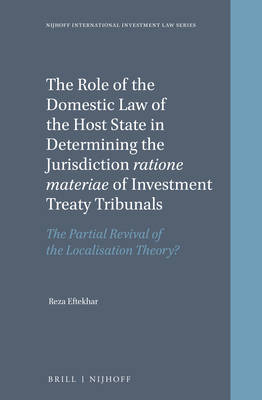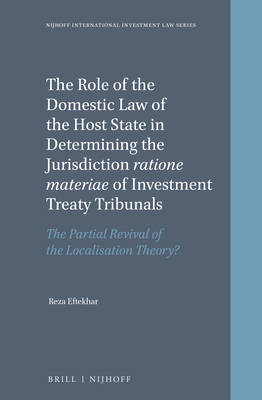
- Afhalen na 1 uur in een winkel met voorraad
- Gratis thuislevering in België vanaf € 30
- Ruim aanbod met 7 miljoen producten
- Afhalen na 1 uur in een winkel met voorraad
- Gratis thuislevering in België vanaf € 30
- Ruim aanbod met 7 miljoen producten
Zoeken
The Role of the Domestic Law of the Host State in Determining the Jurisdiction Ratione Materiae of Investment Treaty Tribunals
The Partial Revival of the Localisation Theory?
Reza Eftekhar
€ 293,45
+ 586 punten
Omschrijving
The Role of the Domestic Law of the Host State in Determining the Jurisdiction ratione materiae of Investment Treaty Tribunals: The Partial Revival of the Localisation Theory? focuses on the largely unexplored role of the host state law in determining the jurisdiction ratione materiae of investment treaty tribunals. Given domestic law's essential role in subject-matter jurisdiction issues, and in the light of the broader function of host state law and host state courts in contemporary investment treaty law, the author argues that the dormant "localisation" theory that was raised and defended by developing countries in the 1960s-1970s in the context of foreign investment contract disputes has now been partially revived in the area of the investment treaty law. This is a significant milestone in the ongoing discussions on the reform of the investment treaty dispute settlement regime.
Specificaties
Betrokkenen
- Auteur(s):
- Uitgeverij:
Inhoud
- Aantal bladzijden:
- 424
- Taal:
- Engels
- Reeks:
- Reeksnummer:
- nr. 20
Eigenschappen
- Productcode (EAN):
- 9789004469594
- Verschijningsdatum:
- 7/10/2021
- Uitvoering:
- Hardcover
- Formaat:
- Genaaid
- Afmetingen:
- 155 mm x 235 mm
- Gewicht:
- 827 g

Alleen bij Standaard Boekhandel
+ 586 punten op je klantenkaart van Standaard Boekhandel
Beoordelingen
We publiceren alleen reviews die voldoen aan de voorwaarden voor reviews. Bekijk onze voorwaarden voor reviews.








